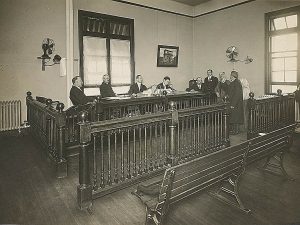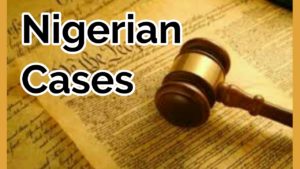This is a summary of the case of Mojekwu v Mojekwu (1997) 7 NWLR (PT 512). Here, you will finds the facts, issues and decision of the Court of Appeal in this celebrated Nigeria case. I enjoin you to read this work painstakingly so that you will be able to understand every information contained here.
It is worthwhile to know that the case of Mojekwu v Mojekwu (1997) 7 NWLR (PT 512), is a well-known Nigerian case where the Court of Appeal made a very significant decision concerning the compatibility of the Igbo customary law and the Constitution of Nigeria. In short, the court of held that the Igbo customary law was invalid because it was not compatible with the constitution of Nigeria. Accordingly, the law was said to be repugnant to natural justice, equity and good conscience.
As we continue, you will understand the reasoning behind this judgment and the position of the law concerning customs and traditions currently.

Other customary law cases you should read:
- Ukeje v Ukeje: Fact, Issues and Decision of the court
- Anekwe v Nweke: Facts, Issues and Decision of the court
- Awolowo v Federal Minister of internal affairs
- Donoghue v Stevenson: Fact, issues and decision of the court
- Smith v Selwyn: Facts, Issues and Decision of the court
Facts of Mojekwu v Mojekwu (Summary)
The facts of the case are as follows:
The appellant/plaintiff is the son of Charles Nwofor Mojekwu who died in 1963. Charles Nwofor Mojekwu had one elder brother called, Okechukwu Mojekwu, who also died in 1944. Okechukwu had two wives. One of his wives (Janet) had two daughters while the other (Caroline, the respondent/defendant) had only one son (Patrick Adina). Patrick died during the Civil in the North. He didn’t marry neither did he had any surviving son.

The property in dispute in this case was owned by Okechukwu Mojekwu. He bought it from the Mgbelekeke family of Onitsha under kola nut land tenancy system. It was reported that the Nnewi custom provides that if a man dies leaving a male issue, his property belongs to the child. If on the other hand, the deceased had no male child, the father’s brother will inherit the property. Again, If the brother of the deceased dies leaving sons, his sons will inherit the property of the dead cousin. In particular, the Diokpala, which is the eldest of the sons will inherit the property.
Accordingly, when a man dies and subsequently his only son and brother dies, if his late brother has sons, his first son will inherit the property. The son of the late brother is called “oli-epke”. He inherits the assets and liabilities of the decreased.
Following this custom, the appellant/plaintiff inherited the property under the native law of Nnewi. He equally paid the necessary Kola required to be recognized by the Mgbelekeke family. Both the respondent/defendant (Caroline, one of the wives of Okechukwu) the two daughters of the deceased uncle accompanied the appellant to the Mgbelekeke family for recognition. The two daughters even signed the docket of consent from the Mgbelekeke family as witnesses.
After the Civil War, the appellant went over to the Northern to stay there. The first wife of Okechukwu, Janet, stayed at Nnewi. The appellant, in January 1970, allowed Caroline the second wife to stay in the property and collect rents from all the rooms.
On the first of April, 1982, Caroline (the respondent) started molding blocks on the property in dispute without the consent of the appellant. The appellant stopped her, and also made public notice that the property was not for sell.

He brought an action against the respondent at the High Court where he asked for a declaration that he was the rightful owner of the property in dispute, that the respondent was only entitled to be accomodated in the property in accordance with the Mgbelekeke family of Onitsha Kola tenancy land tenure system of the Kola tenancy law.
In the second set of alternative relief, the appellant asked for a declaration that the respondent should pay all the money received as rent from April 1982 till the date of delivery of judgment, that the respondent was only entitled to be accomodated subject to good behavior and maintained from the property by the appellant during her life time in accordance with the Nnewi native custom and Law.
Again, he asked for a perpetual injunction restraining the appellant, his savants, previes from putting in tenants on the property, leasing, selling or alienating or any part thereof without the appellant’s approval.
Also read: Are lawyers liars? See the truth as to whether lawyers are liars
Issues raised in Mojekwu v Mojekwu
- Whether the law applicable to this case is the personal law of the deceased or his lex situs?
- Whether Exhibit 1, the conveyance between Mgbelekeke family and the appellant can be given in evidence, being an unregistered registrable instrument?
- Whether the high Court was right to raise issues suo motu and resolving them without allowing the parties to address him thereon?
- Whether a court can grant a relief sought by a party for which there is no avermemt in support thereof in his pleading?
- Whether the trial judge failed to evaluate the evidence before him that the appellant is the surviving male issue in the Mojekwu family who is entitled to inherit the property in dispute according to the Nnewi native law and custom?

Also read:
- TOP 10 richest lawyers in Nigeria you should know
- Best universities to study law in Nigeria: Top 10
- How to become a successful lawyer
- Cheapest universities that offers law in Nigeria 2024
- Top law firms in Nigeria to apply law internship
Decision of the court in Mojekwu v Mojekwu
Dismissing the appeal, the court of appeal held that Nigeria is an egalitarian society where the civilized sociology does not allow the discrimination against women. However, there are customs all over which discriminates against the women folk; which regard them as inferior against the men folk. This should not be so as all humans, men or female, born into a free world and are expected to participate freely without inhibition on grounds of sex. Thus, any form of social discrimination on grounds of sex, apart from being unconstitutional, is antithesis to a society built on the tenets of democracy.
In light of the above, the court held that the oli-ekpe custom which allows the son of the brother of a deceased to inherit his property to the exclution of his female children was discriminatory and incompatibility with the doctrine of equity.
Before this decision was reached by the court of appeal, it was agreed that based on the Oli-epke custom of the Nnewi people, the appellant was the rightful owner of the property. However, since this custom is inconsistent with section 14 of the 1999 constitution, it was incompatible with the constitution.
In answering the first question before the court, it was clearly stated that where the peronal law and lex situs of a person is in conflict in respect to land the applicable law is the lex situs. In this instance case, the lex situs, which is the Mgbelekeke family Kola tenancy law applies.
On the issue as to whether Exhibit 1, the conveyance between Mgbelekeke family and the appellant can be given in evidence, being an unregistered registrable instrument. The court held that where a purchaser of a land or a lesee is in possession of a land by virtue a registerable document which has not been registered, and has paid the purchase money to the vendor, the purchaser has acquired an equitable interest in the land which is as good as a legal estate and the legal interest can only be defeated by a purchaser of the land for value without notice of the prior equity.
More so, on the issue as to whether the high Court was right to raise issues suo motu and resolving them without allowing the parties to address him thereon.
The court of appeal unanimously promulgated that it is not every case where the court raises an issue suo motu that an appeal will be allowed. The court further explained this by given two exceptions where a court is allowed to raise issues suo motu.

Edeh Samuel Chukwuemeka, ACMC, is a lawyer and a certified mediator/conciliator in Nigeria. He is also a developer with knowledge in various programming languages. Samuel is determined to leverage his skills in technology, SEO, and legal practice to revolutionize the legal profession worldwide by creating web and mobile applications that simplify legal research. Sam is also passionate about educating and providing valuable information to people.
This article is very educative